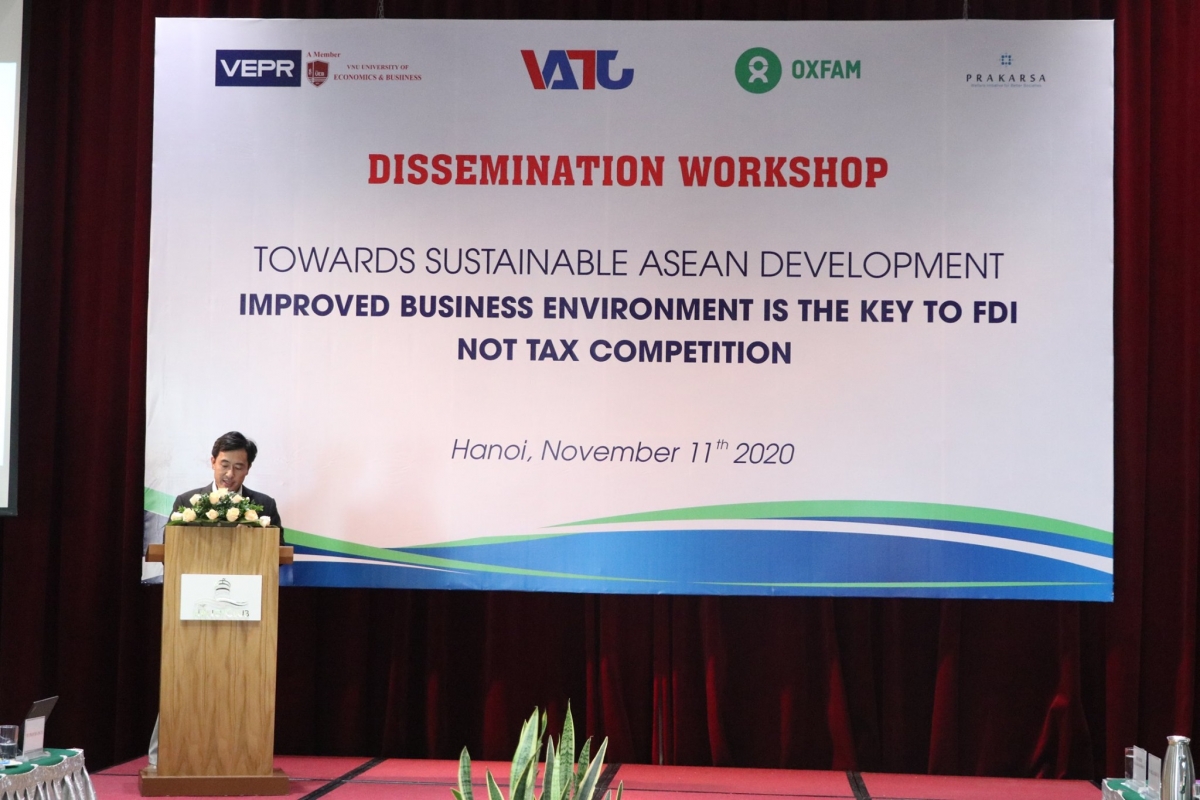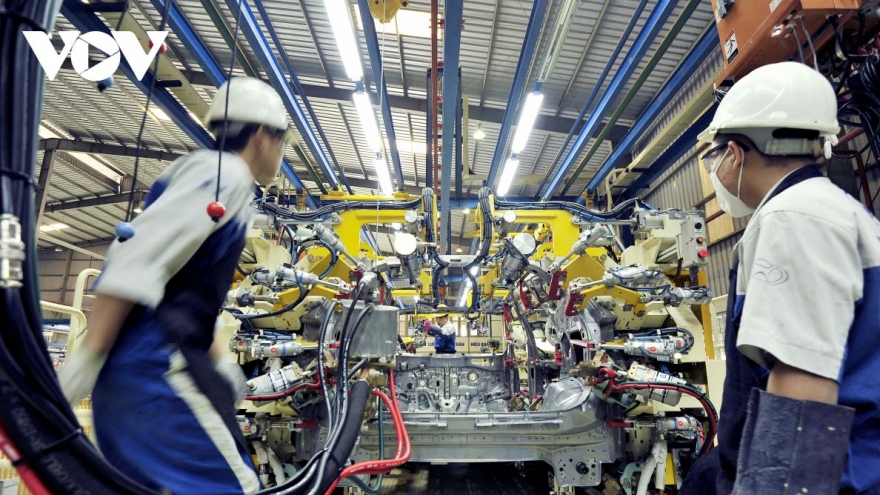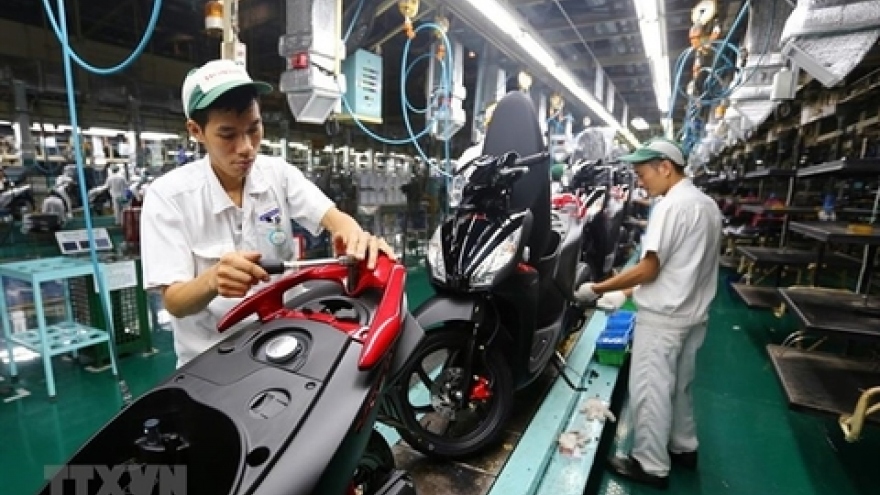Hanoi workshops seeks to improve ASEAN business environment
VOV.VN -A workshop entitled “Towards sustainable FDI attraction in ASEAN: Business environment is the key driver” took place in Hanoi on November 11 to highlight the importance of co-ordinated efforts by various ASEAN governments to halt redundant incentive packages and prioritise enhancing the local business environment for investment promotion.
The event was jointly held by the Vietnam Institute for Economic and Policy Research (VEPR), Oxfam, the PRAKARSA, and other relevant institutions.
In the context of the novel coronavirus (COVID-19) pandemic posing enormous challenges to the bloc, there are other issues relating to a potential health and economic crisis with foreign direct investment (FDI) inflows into developing Asian countries expected to decrease by 30% to 40% along with tax revenues collapsing. Amid these concerns, ASEAN must make key decisions, whether to build recovery based on more wasteful competition between countries as a means of attracting investment, or to choose co-ordination, co-operation, and join hands to gain a sustainable tax revenue. This could then be used to boost health and education services, as well as other public goods which are essential to fight against poverty and inequality.
Before the global outbreak of COVID-19, ASEAN countries were already competing against each other in a race to the bottom by offering excessive tax and non-tax incentives in order to attract FDI without real value generation.
As opposed to developing a stable local business environment, a factor that is proven to be the key determinant of FDI location decisions, all governments in the region have adopted wasteful and aggressive tax policies that largely only benefited major foreign companies, according to recent research conducted by Oxfam and partners.
In response to the pandemic and to build sustainable development, ASEAN must avoid falling into a trap of needless competition. Over the past decade, countries in the bloc have been competing to reduce their Corporate Income Tax (CIT) rates and offer aggressive tax incentives to foreign multinational corporations. Due to these policies, ASEAN’s average CIT rate has declined from 25.1% in 2010 to 21.7% this year.
Alongside CIT cuts, the use of other enormous profit-based incentives to attract FDI, such as tax holidays, are prevalent among ASEAN countries. The costs of redundant fiscal incentives can also exceed the benefits of additional FDI, therefore undermining national tax revenues without any clear evidence of return.
Lost budget revenue due to corporate tax incentives is estimated to stand at 6% of GDP in Cambodia, whilst the figure is 1% of GDP in Vietnam and the Philippines, indicating that these tax incentives can produce negative externalities that can be harmful to economic efficiency.
At present, ASEAN countries are unable to afford such turmoil in relation to the economic and social crisis the region is facing. This has led Ah Maftuchan, executive director of the PRAKARSA, to say, “The bloc must make the choice, to build sustainable and resilient societies which are better prepared to face future shocks, or to help some companies to minimise their tax bills. Who is coming first?”
The use of non-tax incentives, in addition to tax incentives, has been widespread among ASEAN countries and has served to exacerbate the region’s race to the bottom. This competition in providing non-tax incentives largely focuses on land incentives. Long-term land leases are available in all ASEAN countries, with Thailand even allowing foreign investors to own land in some unique cases.
Both Vietnam and Laos provide rent exemptions or reductions to investment projects in underdeveloped regions or they try to promote production activities. This competition in land incentives among ASEAN countries has subsequently served to enhance socio-economic inequality and the non-transparent mechanism of granting land incentives to Cambodia, Laos, and Myanmar, which is open to corruption and rent seeking.
“While competing in business, the environment is a race to the top, competing in tax and land incentives is a race to the bottom. The granting of land incentives, particularly the extension of leasehold term, lacks transparency, which may increase the risks of corruption”, said Dr. Nguyen Duc Thanh, co-founder and chief advisor of the VEPR.
The ASEAN region is currently experiencing unprecedented economic inequality, with some countries continuing to have the highest poverty levels worldwide and most countries in the region still failing to invest sufficiently in essential public services. The impact of COVID-19 will only contribute to amplifying issues relating to poverty and inequality due to the differences people’s ability to secure jobs and in terms of each individuals’ level of access to health care.
Myanmar, Indonesia, Vietnam, and the Philippines are among the top 20 countries to record the largest increase in poverty headcount ratios due to COVID-19.
Unnecessary tax and non-tax incentives have affected many countries capacity to mobilise domestic revenue and spend sufficient amounts on essential public services to combat the pandemic alongside fighting poverty and reducing inequality. “The absurd situation is that they may not necessarily determine the level of FDI inflows as many policy makers often think,” said Dr. Thanh. As such many researches believe that business environment indicators are key determinants of FDI location decisions. This includes factors such as economic stability, political stability, local markets, transparency of legal framework, labour quality, and the quality of infrastructure, particularly the density of high-quality roads.
The report, which builds upon comparative experiences of other regions and exploring case studies from ASEAN, makes five recommendations for ASEAN countries to act upon in a united manner. This include, setting up black and whitelists of tax incentives to check for harmful taxation, stopping competition to provide site incentives, agreeing on a common minimum tax standard, establishing rules for the competent governance of investment incentives, and agreeing upon a list of business environment factors that are key to attracting FDI.
“ASEAN countries should join hands in the battle to fight poverty for millions of lives in the region. It’s high time to realise that tax incentives and non-tax incentives are deepening social and economic inequalities, and that is not the key to sustainable foreign investments. Every government needs sustainable revenue to spend on health and education services and other public goods which are essential to fight poverty and inequalities; so, all the member states need to unite to prioritize enhancing business environment instead of giving away ineffective incentives”, said Mustafa Talpur, regional inequality campaign lead of Oxfam in Asia.




